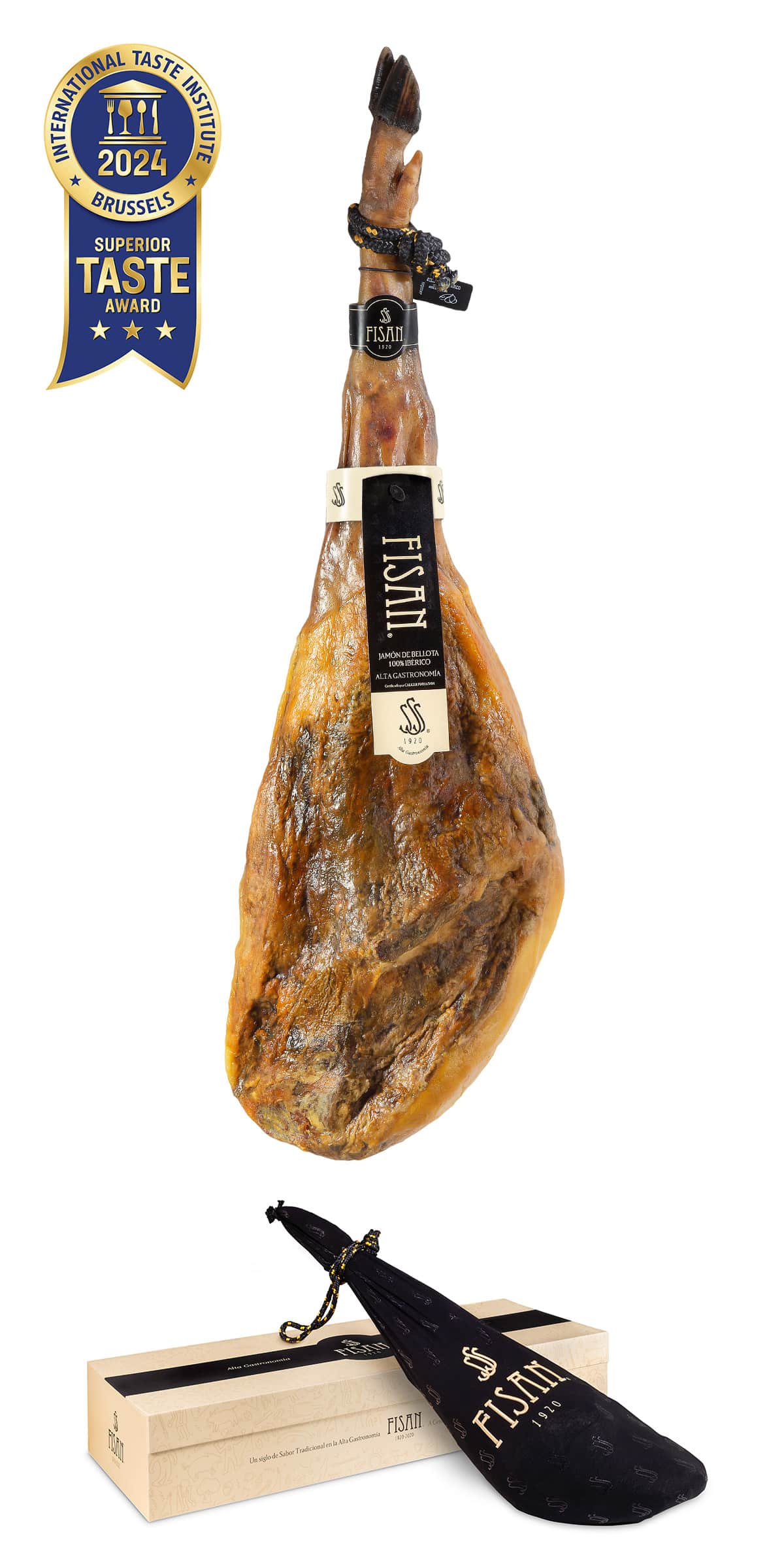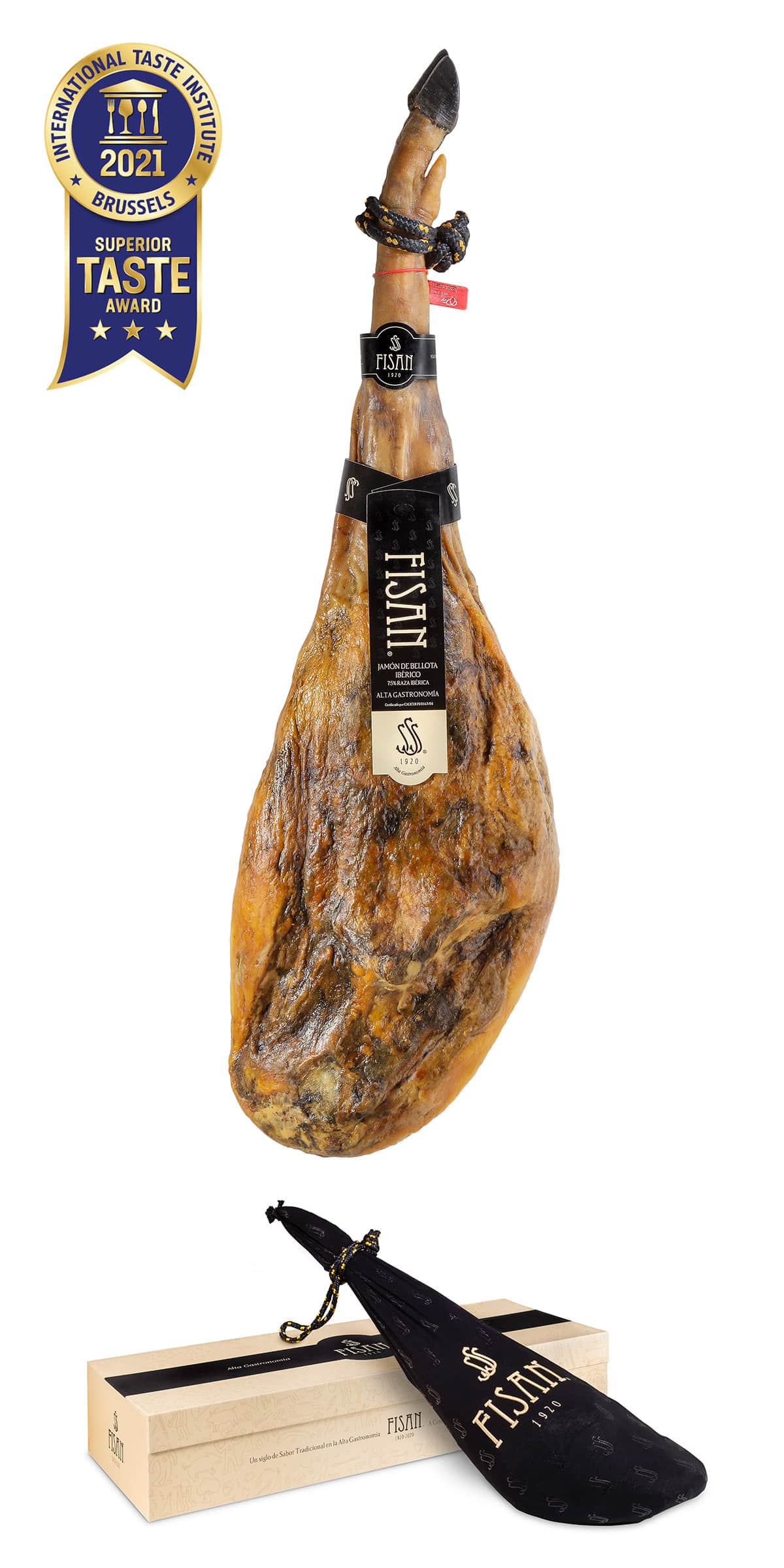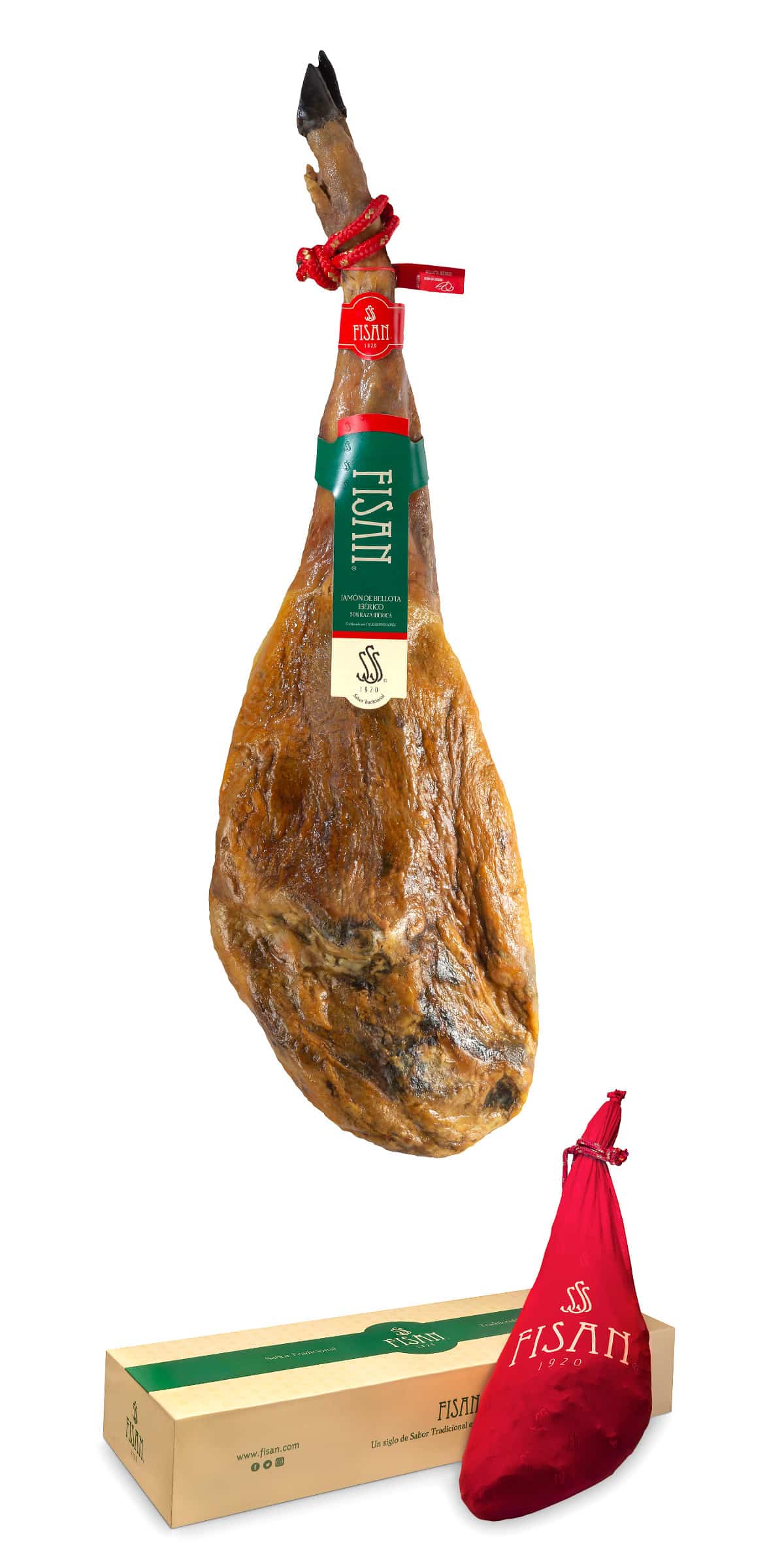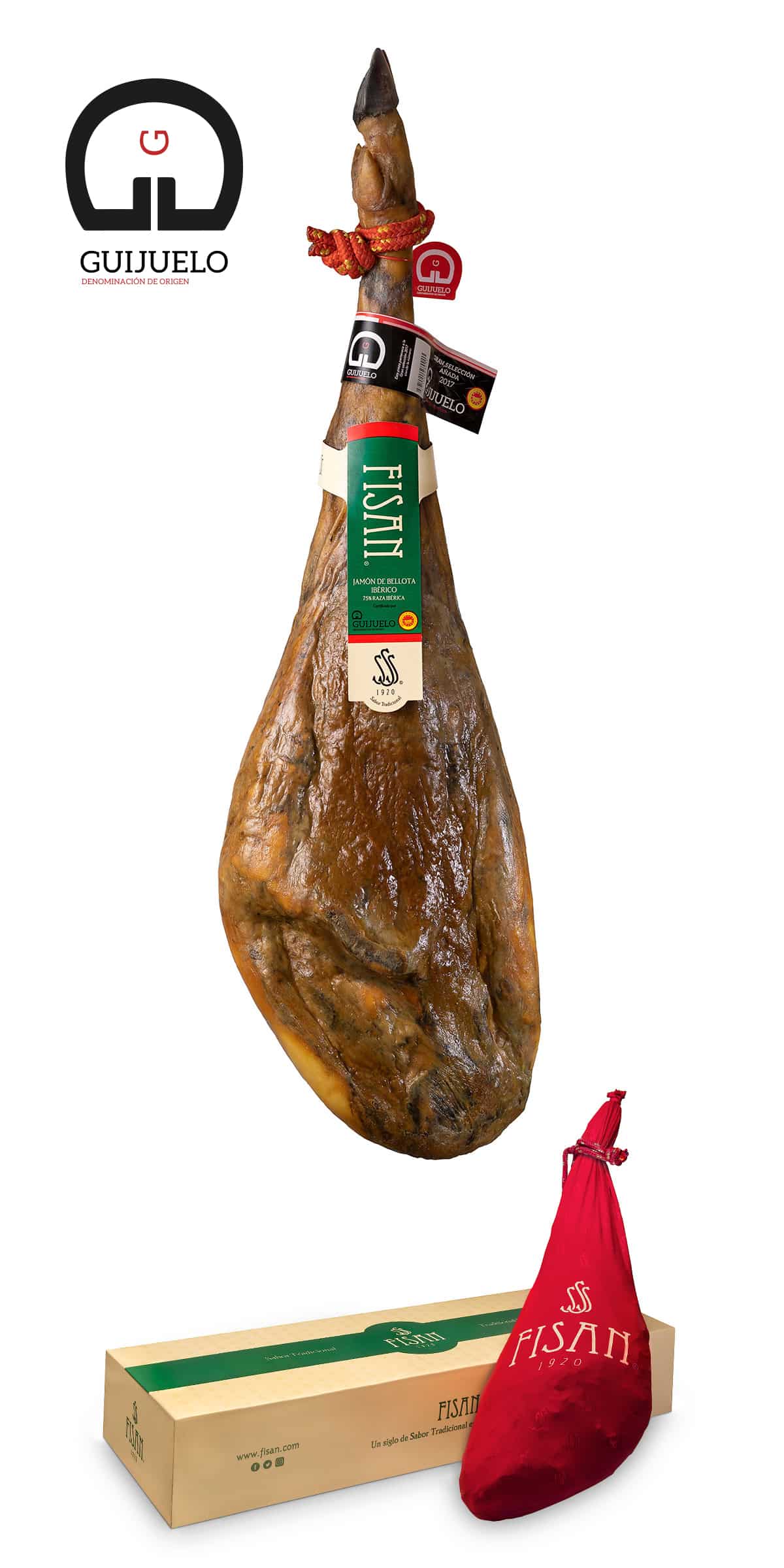Bellota iberico ham that you can buy
The FISAN bellota iberico ham are the result of tradition and the work of a family committed to the highest quality. Our centuries-old know-how make the difference in Iberico hams. Discover our selection of gourmet products A unique gastronomic experience!
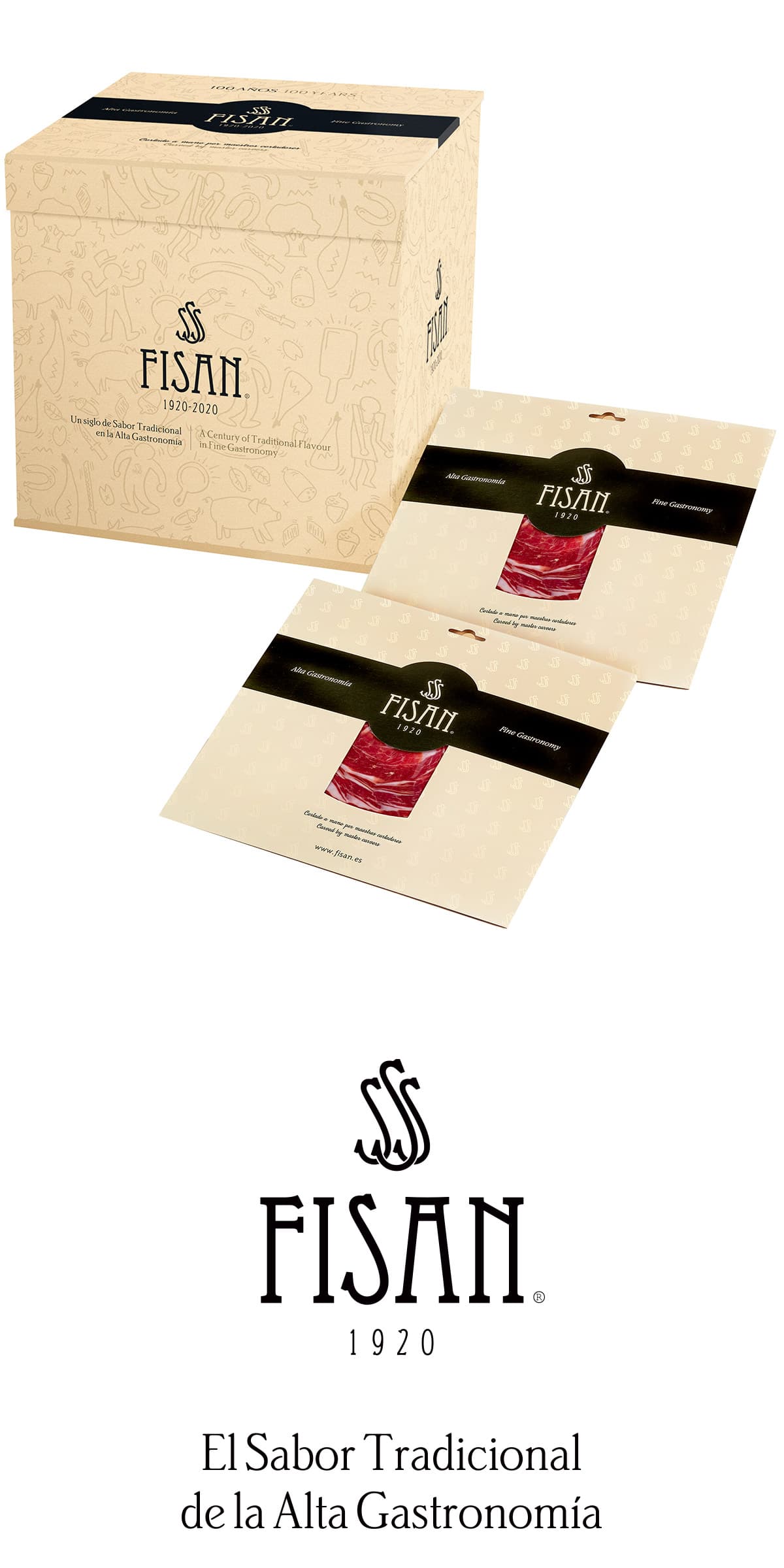
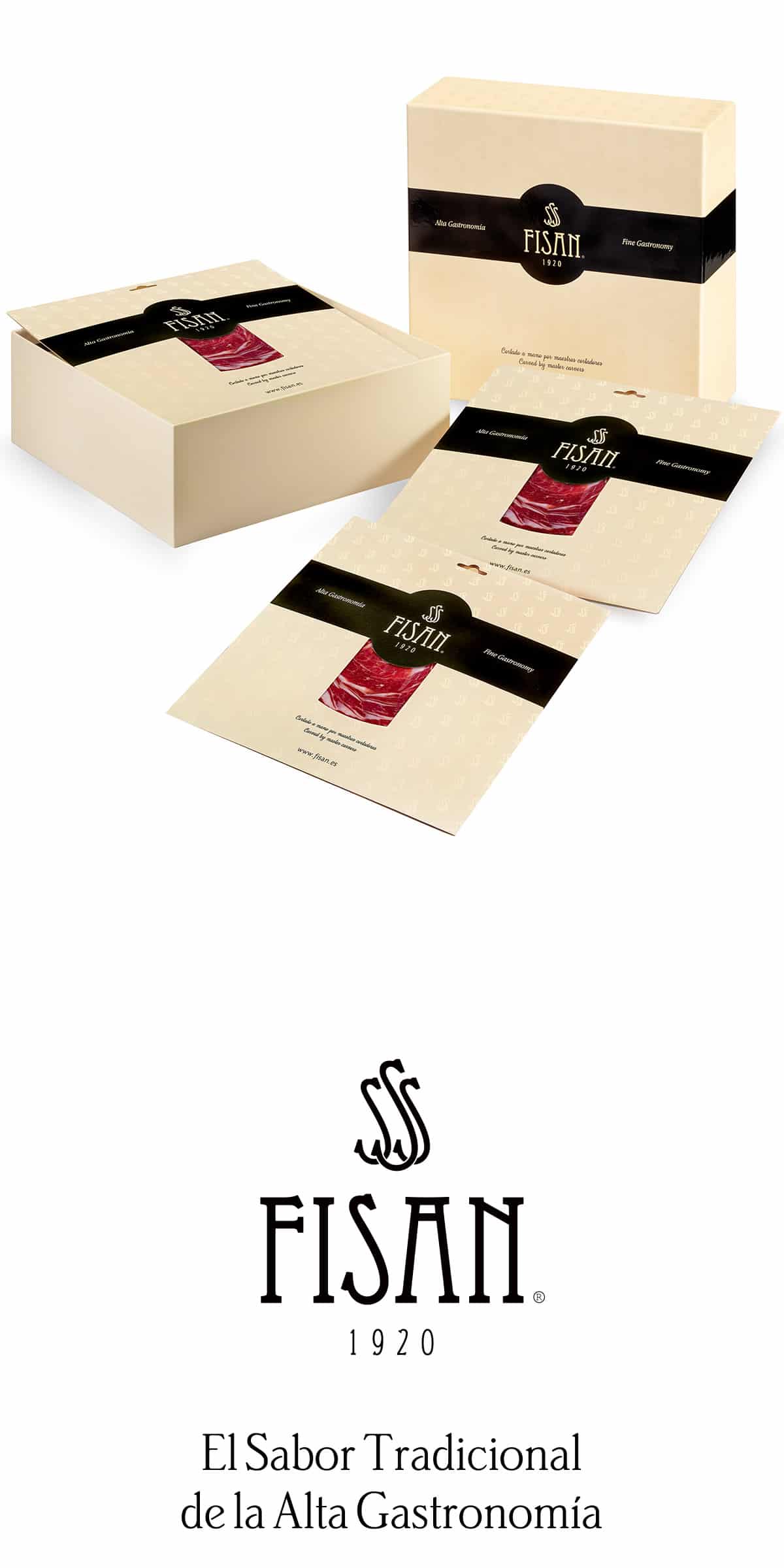
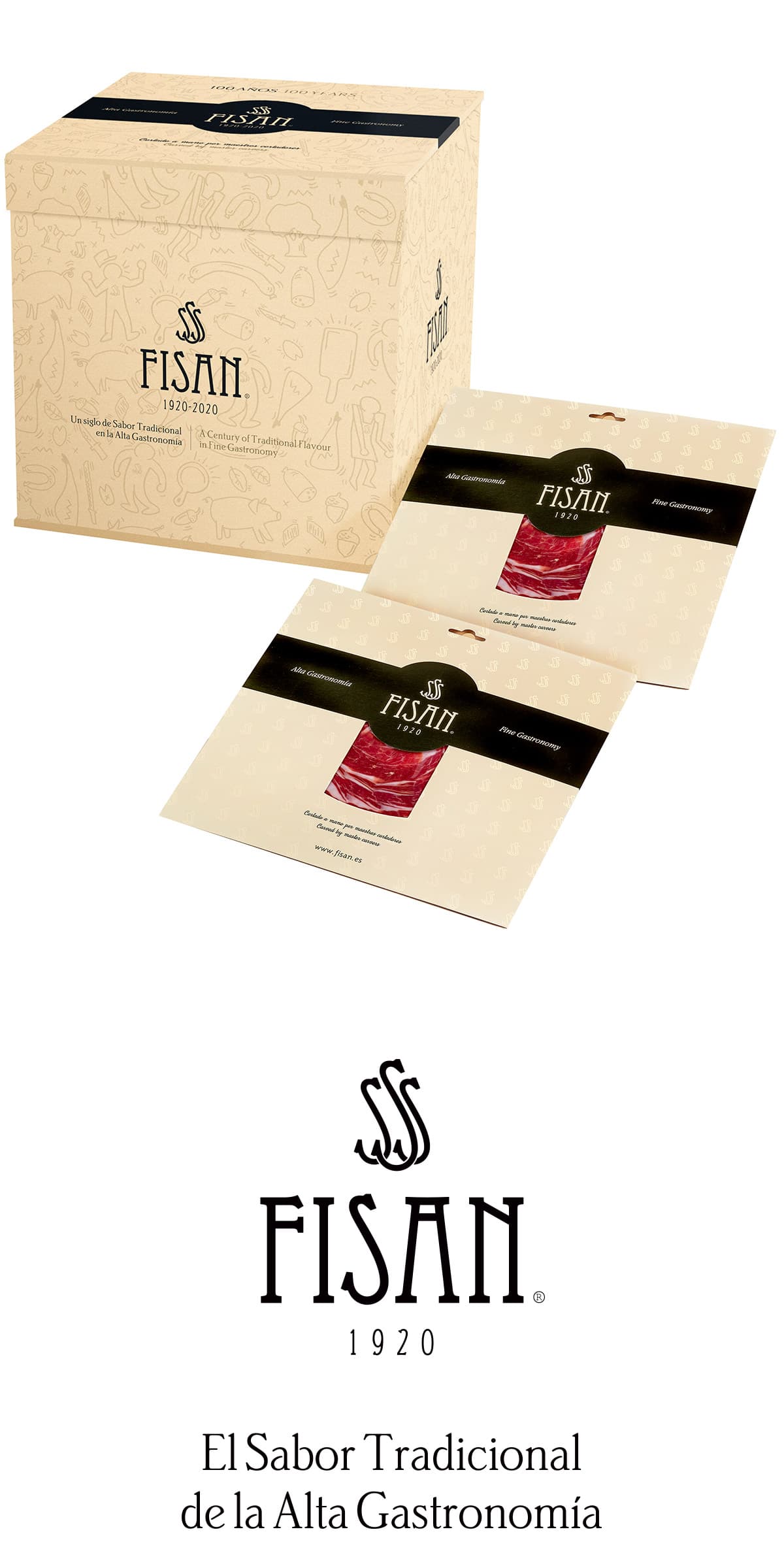
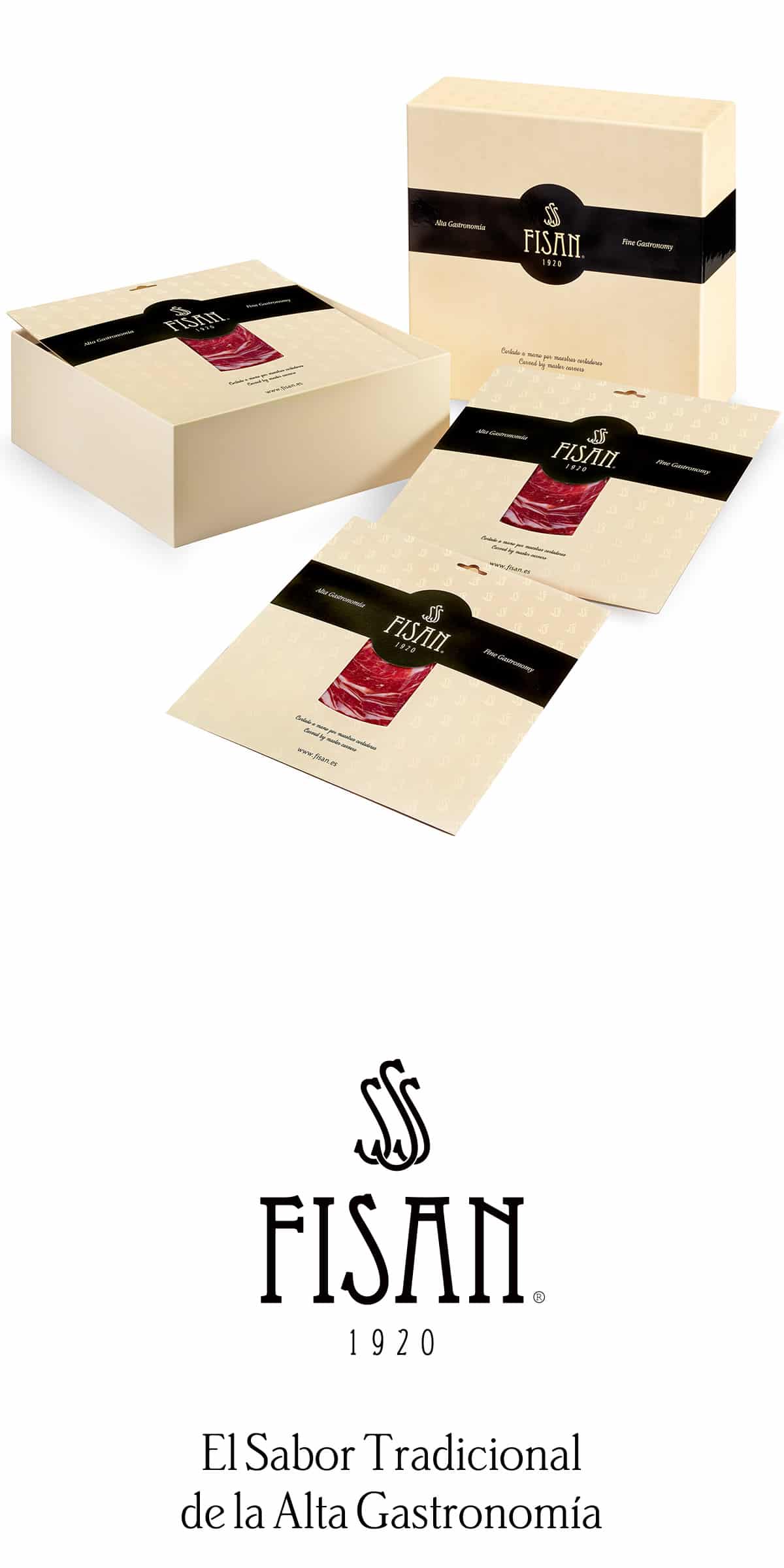
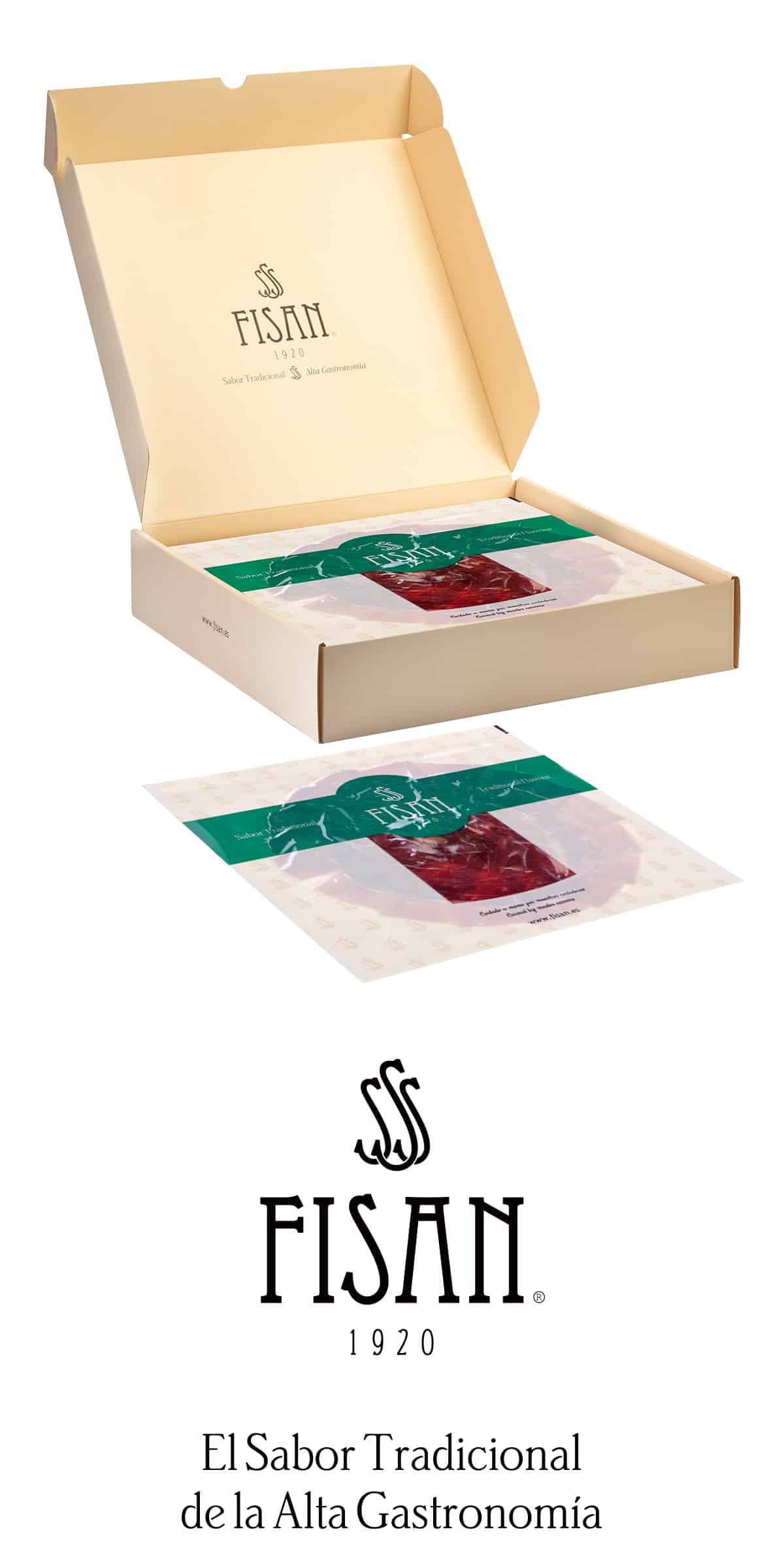
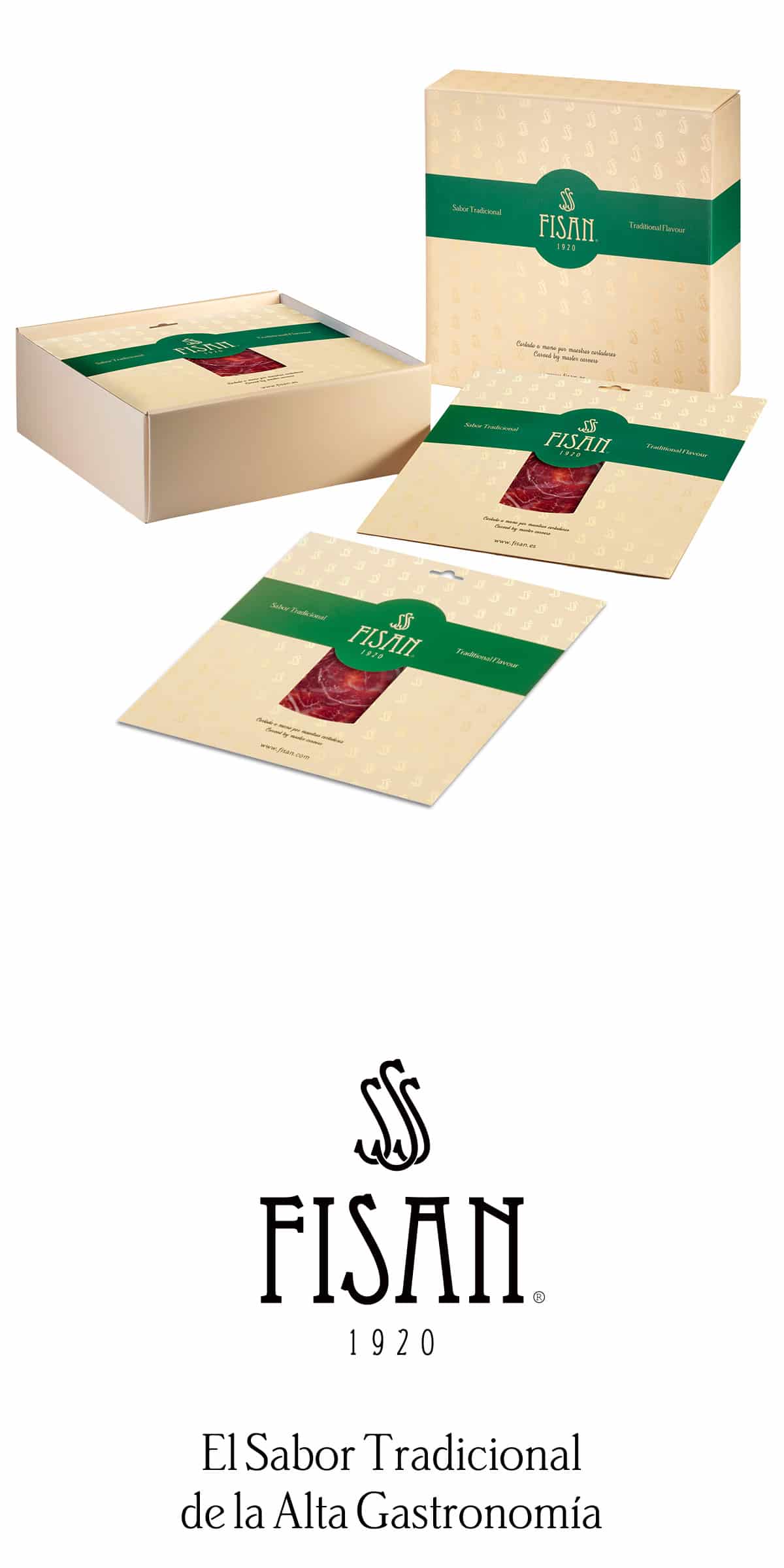
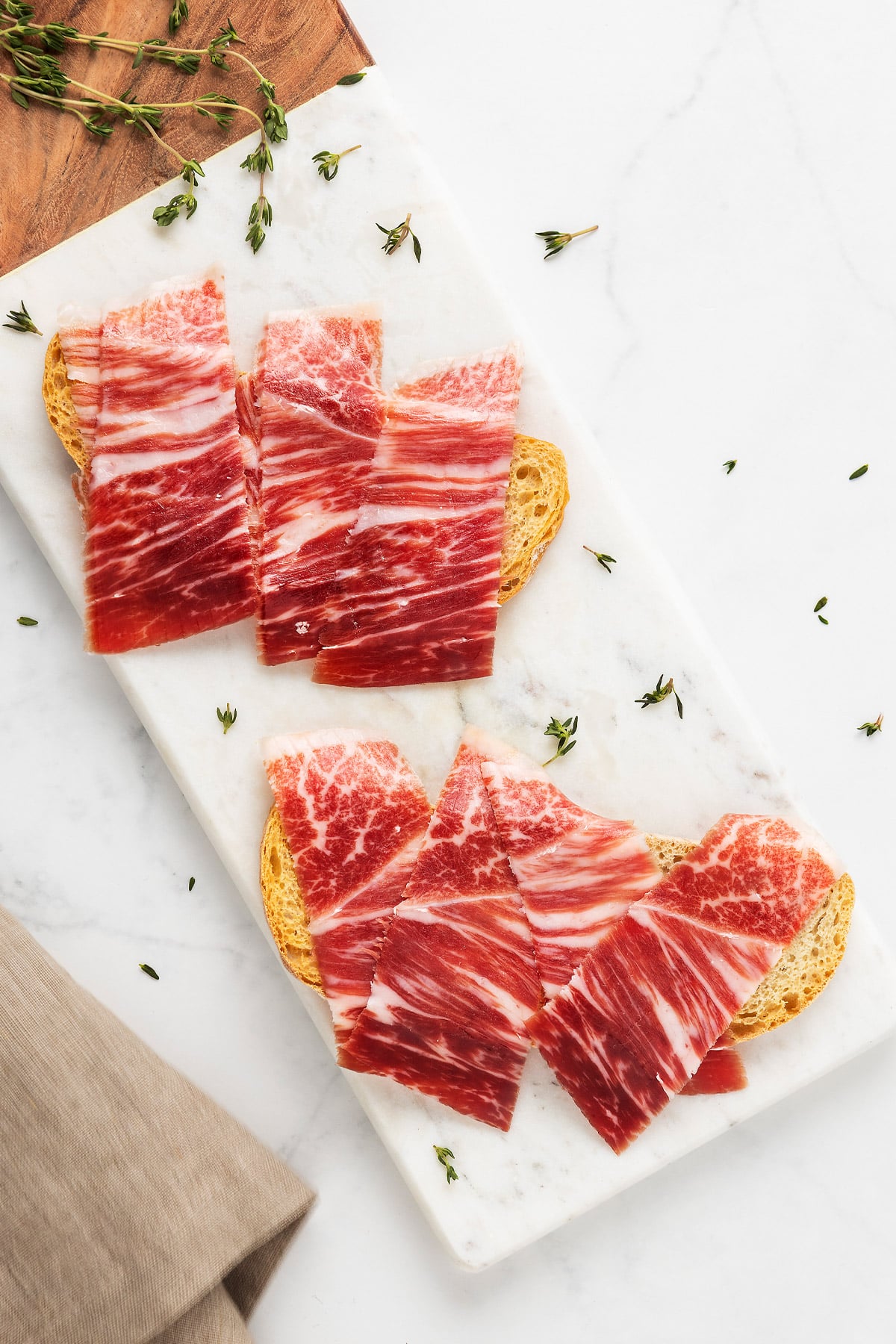
The 10 most frequently asked questions about bellota ham
WHAT DOES BELLOTA HAM MEAN?
A ham qualifies as bellota when it comes from Iberian race pigs that have fed on bellotas (acorns) during the fattening period. The dehesa is their natural habitat and its holm oaks give enough bellotas to feed the choicest Iberian pigs. Bellota ham is the most highly coveted and valued by the most demanding palates.
From October to March, the pig only feeds on bellotas, which provide the quality and unique properties of both ham and all the bellota Iberico products that are made from this excellent raw material.
WHAT ARE THE BENEFITS OF BELLOTA HAM?
Bellota 100 % Iberico ham has a lot of health benefits. Its high protein, fatty acids, mineral and vitamin content makes it an essential part of a healthy diet:
- It supports cardiovascular health. Its 55% oleic acid content helps to fight cholesterol.
- Its iron content prevents anaemia.
- It increases the body’s energy levels. This extra supply is provided by vitamins belonging to groups B, D and E, as well as minerals such as potassium or zinc.
- Its high protein content contributes to muscle strengthening.
- It improves mood thanks to minerals such as phosphorus.
TYPES OF BELLOTA IBERICO HAM
According to the current Iberico Standard categories there are different seals. In FISAN we use a colour range according to the basis of the pigs’ diet:
- Black seal: bellota 100 % Iberico ham from pigs whose father and mother are 100% Iberian breed and have fed on bellotas and other natural resources in the dehesa. It belongs to the FISAN Alta Gastronomía range.
- Red seal: bellota Iberico ham from 75 % Iberian breed pigs whose diet is bellota-based during the montanera. It belongs to the FISAN Alta Gastronomía range.
It can also be bellota Iberico ham 50% Iberian breed from pigs who have fed on bellotas and other natural resources in the dehesa during the fattening period, belonging to the FISAN Sabor Tradicional selection.
As well as being endorsed by the Iberico Standard, the quality of bellota ham is also related to the artisanal preparation of this type of ham and the years of experience that distinguish FISAN, which makes these pieces unique worldwide.
FISAN cebo de campo Iberico ham is also included in the Iberico Standard under a different label:
- Green seal: cebo de campo Iberico ham, from 100%, 75% or 50% Iberian breed pigs that have fed on natural pastures and feeding stuffs in the field during the fattening period.
WHAT IS THE DIFFERENCE BETWEEN CEBO AND BELLOTA HAM? WHICH IS BETTER?
The main difference between bellota and cebo ham is the pig’s diet:
- Bellota ham comes from pigs that have fed on bellotas and other natural resources available in the dehesa during the fattening period.
- Cebo ham comes from pigs that have been fattened with feeding stuffs and cereal.
In addition to the pig’s food, there is another difference: where and how the animal lives.
- Bellota ham comes from pigs that have freely or semi-freely roamed the dehesa during the montanera months.
- Cebo ham comes from pigs that have been released onto the field outside the montanera season, when there are hardly any bellotas available, or that have lived in intensive rearing pens.
These two characteristics make bellota ham a unique gastronomic jewel with higher quality than cebo ham. Iberico bellota ham is much appreciated for its fine taste and fat marbling. This is given both by the bellota-based diet and the exercise done by the pig when it freely roams the dehesa to obtain its food.
At FISAN we have cebo de campo iberico hams that are identified by their green seal and band, in keeping with the Iberico Standard. Although they live in semi-freedom, the pigs they come from only roam the dehesa feeding on bellotas at the end of the montanera season. During the rest of the months, they feed on natural pastures and cereal.
HOW DO WE KNOW THAT IT IS A BELLOTA HAM?
To qualify as bellota ham the pig must have fed on bellotas in the dehesa during the fattening period. The seals that identify that it has followed this type of diet are black (100% Iberian breed) or red (75% or 50% Iberian breed). Bellota ham is oily, with sweet notes, an intense aroma and a melt-in-the-mouth texture.
HOW MUCH DOES A BELLOTA IBERICO HAM LEG WEIGH?
According to the Iberico Standard (RD Royal Decree 4/2014), a leg of bellota 100% Iberico ham should weigh at least 5.75 kg.
In the case of bellota 75% or 50% Iberico ham, the minimum weight required to be marketed is 7 kilos.
HOW MANY CALORIES ARE THERE IN 100 GRAMS OF BELLOTA IBERICO HAM?
A 100g serving of ham provides around 240 calories, which is 12% of the daily amount of energy required by an adult. Apart from being a gourmet product, bellota ham is healthy since its fat is high in oleic acid, which protects against cardiovascular diseases.
WHERE ARE THE PIGS THAT PRODUCE THE BEST BELLOTA HAM RAISED?
The best bellota ham comes from Iberian pigs raised in dehesas located in:
- Extremadura
- Area of Los Pedroches, in Córdoba
- Sierra de Aracena, between Huelva and Seville
These dehesas are unique ecosystems both because of their expanse and their capacity to supply the Iberico pigs with acorns throughout the animal’s most intense fattening period, the montanera, from October to March. These areas afford pigs the freedomof movement that they need and a wealth of bellotas from holm and cork oaks.
The quality of bellota ham relies both on the pig’s Iberian race and the exercise it does in the vast dehesas, as well as on its exclusive bellota diet.
HOW SHOULD BELLOTA IBERICO HAM BE EATEN?
Making the most of the gastronomic experience of eating bellota ham is easier if you follow these tips:
- Slice the ham thinly at room temperature, ideally between 22-22 degrees, and never when cold.
- Place the bellota ham on the plate as it is being cut so that the raw material is handled as little as possible. It is best to serve only one layer.
- Serve with bread slices, crunchy sticks, or pa de vidre if it is going to be enjoyed as an appetizer.. For an afternoon snack, there is nothing like a bellota ham sandwich with a dash of extra virgin olive oil.
- Combine it with wine according to the occasion. Fino and Manzanilla wines enhance its flavour, and even champagne goes nicely with bellota ham. Reserva and young wines such as dry white ones are also good accompaniment to enjoy the delicacy.
HOW LONG DOES BELLOTA HAM LAST?
A bellota ham’s preferential consumption period is within one year from its release from the factory, although it is recommended that you start enjoying it within the month following its purchase date. The drying process continues at home; therefore, the exact duration of bellota ham depends on the curing stage of each piece.
On orders over €100
All payments made in our store are secure.
